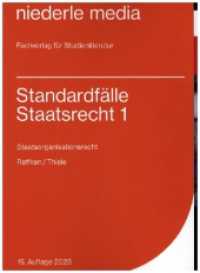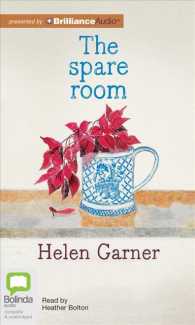- ホーム
- > 洋書
- > 英文書
- > Literary Criticism
Full Description
This book explores the major paradoxes of Russian literature as a manifestation of both tragic and ironic contradictions of human nature and national character. Russian literature, from Pushkin and Gogol to Chekhov, Nabokov and to postmodernist writers, is studied as a holistic text that plays on the reversal of such opposites as being and nothingness, reality and simulation, and rationality and absurdity. The glorification of Mother Russia exposes her character as a witch; a little man is transformed into a Christ figure; consistent rationality betrays its inherent madness, and extreme verbosity produces the effect of silence. The greatest Russian writers were masters of spiritual self-denial and artistic self-destruction, which explains many paradoxes and unpredictable twists of Russian history up to our time.
Contents
Introduction
Part I: The Titanic and the Demonic: Faust's Heirs
1. Faust and Peter on the Seashore: From Goethe to Pushkin
a. Comparativistics and Typology
b. Toil and the Elements
c. The Bronze Horseman as the Anti-Faust
d. Demonic Irony
e. Pushkin between Goethe and Mickiewicz
f. Apocalypse
g. The Transformation of the Faustian into the Mephistophelian
2. The Bronze Horseman and the Golden Fish: Pushkin's Fairy Tale-Poem
a. Semantic Convertibility
b. Textual Parallels
c. The Subjugation of the Elements, and Their Retribution
d. Peter and the Old Woman: A Pair of Autocrats
e. The Fate of the "Little Man"
f. The Family and the State
g. The Poem and the Tale as a Single Work
3. The Motherland-Witch: The Irony of Style in Nikolai Gogol
a. The Irony of Style and the Apotheosis of Russia
b. An Aesthetic Demonology of Russia
The Stare or Fixed Gaze
Rootedness to the Spot
Light and Chiming
Ghostly Light
Chiming and Weeping
Dream and Waking
Fast Riding, Flickering
c. Patriotism and Eroticism
d. Blok Gives Gogol's Secret Away
e. Gogol, Betrayed by Words: The Irony of Style
Part II: The Great in the Little: Bashmachkin's Offspring
1. The Saintly Scribe: Akaky Bashmachkin and Prince Myshkin
2. The Figure of Repetition: The Philosopher Nikolai Fedorov and His Literary Prototypes
3. The Little Man in a Case: The Bashmachkin-Belikov Syndrome
Part III: The Irony of Harmony
1. Childhood and the Myth of Harmony
2. The Defamiliarization of Lev Tolstoy
a. The Death of Ivan Ilyich
b. "Alesha-the-Pot"
c. Happy and Unhappy Families: Anna Karenina
3. Soviet Heroics and the Oedipus Complex
a. "Big Brother": Between Freud and Orwell
b. The Mythological Basis of Materialism
c. Militant Atheism and the Oedipus Complex
d. The Call of the Underworld: The Erotics of the Worker's Blow
e. Materialism as Rooted in Mat
f. Mother-Worshippers and Incestors
Part IV: Being as Nothingness
1. A Farewell to Objects, or, the Nabokovian in Nabokov
2. The Secret of Being and Nonbeing in Vladimir Nabokov
a. The Chain of Negations: Omnipresent "Nonnons"
b. "A Series of Hinged Lids"
c. Physical Vacuum and the Buddhist Nirvana
d. The Secret of the Afterlife
3. Andrei Platonov between Nonbeing and Resurrection
a. Russian Literature and German Philosophy
b. The Nonbeing within Being
c. Between Martin Heidegger and Nikolai Fedorov
d. A Strange Language: On the Other Side of Subject and Object
e. The Boring Void and Deathening
f. Nabokov and Platonov: A Metaphysical Dispute
4. Dream and Battle: Oblomov, Korchagin, Kopenkin
a. Oblomovka and Chevengur
b. Warrior-Dreamers
c. Oblomagin: Bipolarity in Russian Culture
Part V: The Silence of the Word
1. Language and Silence as Forms of Being
a. Quietude and Silence
b. The Word as Being
c. The Beingfulness of the Russian Word
2. The Ideology and Magic of the Word: Anton Chekhov, Daniil Kharms, and Vladimir Sorokin
a. The Word-Figment: Daniil Kharms and Anton Chekhov
b. Three Literary Episodes: The Silence within and around the Word
3. The Russian Code of Silence: Politics and Mysticism
a. The Eternal Quiet
b. Two Silences: Political and Mystical
c. The Formative, Informative, and Fictive Word: The Self-Devouring of Language
Part VI: Madness and Reason
1. Methods of Madness and Madness as a Method: Poets and Philosophers
a. Hölderlin and Batiushkov
b. Two Half-Witted States (poloumie): Poetic and Philosophical
c. Madness as Method
d. The Self-Critique of Pure Reason
2. Poetry as Ecstasy and as Interpretation: Boris Pasternak and Osip Mandelʹshtam
a. Alien Language: Poetry and Kabbalah
b. Pasternak, Hasidism, and the Sparks of the Universe
c. Mandelʹshtam, Talmudism, and the Textbook of Infinity
3. The Lyric of Idiotic Reason: Folkloric Philosophy in Dmitrii Prigov
a. Folkloric Philosophism: The Poetics of Platitude
b. The Stripped Consciousness. A World without a Groove. Allthing and Allbody.
c. The Banality of Abstraction: The Deeply Thoughtful Unconscious
The Cyclical Development of Literature
Conclusion
a. Literature and Metaphysics
b. Metanarratives
c. Metaphysics without a Metanarrative







